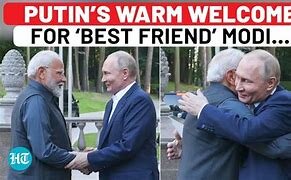How to save $200 million instantly. Cut off foreign aid to India, which just swore allegiance to Putin.

You’ve seen the picture above all over the internet this week. India’s prime minister Modi (persecutor of minorities, human rights violator, and the guy who imposed martial law on his country last month). He’s giving Vladimir Putin a “bear hug”, to affirm that they’re BFF.
Wait . . . wasn’t it just a year ago (June 2023) that President Biden was feting Modi at a lavish white house state dinner? And announcing a new era in US-India ties? Which included trade concessions, and supplies of US weapons? (see Reuters link below). Da-yum!! This may be the shortest-lived strategic alliance ever!
Before we go any further, let me give props to America’s progressives. Last June, before the Sumac roasted sea-bass (marinated in dahi Indian yogurt) was even out of the White House kitchens, the American left pointed out that Modi is a snake who can’t be trusted. You internationalists were 100% right. You should have yelled louder last year. Me too. The NYT and WaPo should have paid attention. Perhaps the US media was too preoccupied with ignoring Biden’s advancing Parkinsons disease? The incomprehensible speech and jerky body movements. Which white house staff tricked this “well-meaning, elderly man with a poor memory” to kiss up to Modi, and why? Is this some long game regarding Hindu American democrat voting blocs? Showering money on India, and selling them jet fighters certainly isn’t about our national interests. I already opposed US foreign aid to India because they’re a nuclear bomb toting power, with long range missiles. What the hell do they need US taxpayer dollars for?
Back to the $200 million in foreign aid (see link). This isn’t the largest amount of American aid to a single nation, but it’s still substantial. And all money is fungible. That means $200 million from the US allows India to spend $200 million from its own savings to buy . . . Russian oil, in violation of the international sanctions.
Wait, India NEVER agreed to honor the sanctions. That’s their choice, and it’s legal. Modi can give bear hugs to all the dictators he wants. But we don’t have to hand out $200 million and sell him jets and share intel while he cozies up to mass murderers. These sort of dictator payoffs are what cooked our goose in Iraq, Afghanistan, Vietnam, and Pakistan. Let’s cut Modi off, immediately. There’s no rainbow here, let alone a pot of gold at the end of it. A (balanced budget) journey of a thousand miles begins with a single step.
I’m just sayin’ . . .
~U.S. Foreign Assistance by Country~
~Biden, Modi hail new era for US-India ties and tout deals | Reuters~


